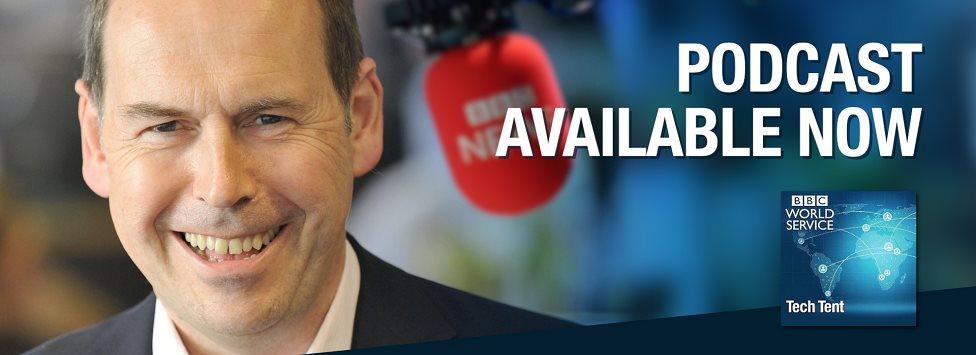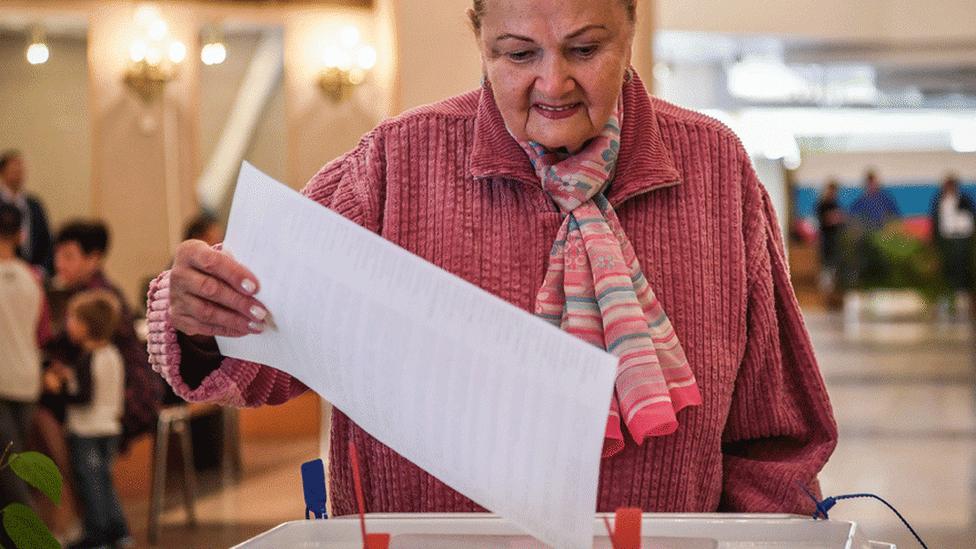Tech Tent: How cats and Russia are using the blockchain
- Published

Stream the latest Tech Tent episode on the BBC website
Download, external the latest episode as a podcast
Listen to previous episodes on the BBC website
Listen live every Friday at 14.00 GMT on the BBC World Service

What do virtual cats and a Russian voting system have in common? They both depend on the blockchain, and on Tech Tent this week we discover why this technology is becoming hugely fashionable as the value of crypto-currencies which depend on it soar. Plus we hear from Taiwan, a high tech nation that is still struggling to create a start-up culture.
Blockchain for the masses?

'CryptoKitties on the Ethereum blockchain'
When I read out the above headline at a BBC editorial meeting, suggesting this was an important story, people looked at me as though I had lost my mind. But a new online craze where you buy virtual kittens with the crypto-currency Ethereum is a serious matter.
CryptoKitties is based on Ethereum, the crypto-currency second only to Bitcoin in popularity, and uses the Ethereum blockchain, a networked database which records transactions on multiple computers.
But such has been the excitement about these fantasy felines that Ethereum - and the blockchain which underpins it - have seized up at times during the week.
Elsa Wilk, head of marketing for Axiom Zen, which is behind CryptoKitties, tells Tech Tent that it has succeeded beyond the company's wildest expectations.
One cat - the "Genesis Kitty" - went for an extraordinary $100,000 (£74,700).
But she says the project has a very important mission: "We wanted to bring fun and games to a very serious matter, which is blockchain. It is seen as very technical, very difficult to use - we wanted to bring blockchain to the masses."
What they have also done is show up some serious problems with the technology - that it can struggle to cope with large volumes of transactions. I've been trying and failing to buy a CryptoKitty all week, stuck watching nothing happen when I try to pay, and others report similar experiences.
"What you are seeing now is just growing pains," says Elsa Wilk. But with blockchain technology now being touted as the biggest thing since the arrival of the internet, the CryptoKitties are a warning that it may not always be fit for purpose.
Voting via blockchain?

Blockchain could make attempts to tamper with results impossible
But wait a minute - if this technology really does guarantee trust and transparency then blockchain could be the way we stage elections, right? At least that's the theory behind a scheme in Russia which will see the technology adopted by Moscow's Active Citizen e-voting system.
This is used for relatively trivial community votes on issues like the naming of a new subway station. But even here, the city's innovation adviser Andrey Belozerov tells us, there can be a lack of trust: "In every large city there are some people who think authority is not transparent, - they say we increase votes."
He says blockchain will make voting "absolutely transparent" - votes will be recorded just like Bitcoin transactions on multiple computers and any attempt to tamper with the results will be visible to everyone.
I was somewhat sceptical that voters would understand what made this system so trustworthy but Mr Belozerov says "any technologist who knows blockchain understands that it is impossible to change data or delete data after it is put in".
Mind you, here's one problem. The Moscow e-voting system is going to use the Ethereum blockchain. If it gets choked up with CryptoKitties, Russian voters may find that it cannot cope with a rush to the polls.
Taiwan's tech reboot

Will next Facebook come from Taiwan?
Taiwan is one the world's leading locations for hi-tech manufacturing, churning out millions of laptops and mobile phones every year.
But with competition from cheaper locations mounting, the country is hoping to nurture a new breed of software start-ups. The trouble is that Taiwanese culture is not too encouraging to entrepreneurs willing to risk all to start a business that is very likely to fail.
Ronald Yu, who's building a mobile app to help people find parking spaces, admits it's a challenging environment: "My family used to say "It's hard, you're not going to be successful" and the government says "Are you going to do this? I'm afraid you're not going to survive in the next 3 to 5 months.""
He says the country needs to be more positive if it is to build the next Facebook or Instagram.
Taiwan's digital minister Audrey Tang admits that entrepreneurs face all sorts of hurdles - regulation, a lack of venture capital, a brain drain of talent: " I think the fourth is the general culture of being more risk-averse and not rewarding people who want to take risks enough. "
Nevertheless, there are plenty of hopeful young entrepreneurs who believe they can break through in new industries such as virtual reality. Like so many countries, Taiwan has ambitions to be the next Silicon Valley - if it can bring a bit more risk-taking into its culture, it has as good a shot as anywhere.
- Published5 December 2017
